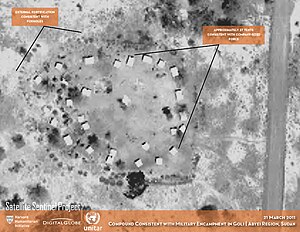Satellite Sentinel Project: Difference between revisions
No edit summary |
No edit summary |
||
| Line 39: | Line 39: | ||
The Satellite Sentinel Project marks the first sustained, public effort to systematically monitor and report on potential hotspots and threats to security along a border, in near real-time (within 24-36 hours), with the aim of heading off humanitarian disaster and human rights crimes before they occur. |
The Satellite Sentinel Project marks the first sustained, public effort to systematically monitor and report on potential hotspots and threats to security along a border, in near real-time (within 24-36 hours), with the aim of heading off humanitarian disaster and human rights crimes before they occur. |
||
Not On Our Watch provided seed money to launch the Satellite Sentinel Project. The Enough Project contributes field reports, policy analysis and communications strategy, and, together with Not On Our Watch and its SUDANNOW partners, pressures policymakers by urging the public to act. [[Google]] and Trellon collaborate to design the web platform. [[Harvard Humanitarian Initiative]] provides research and leads the collection, human rights analysis, and corroboration of on-the-ground reports that contextualizes the imagery. [[DigitalGlobe]] provides satellite imagery and additional analysis. |
|||
The Satellite Sentinel Project marks the first sustained, public effort to systematically monitor and report on potential hotspots and threats to security along a border, in near real-time (within 24-36 hours), with the aim of heading off humanitarian disaster and human rights crimes before they occur. The project has discovered eight mass graves in [[South Kordofan]], [[Sudan]]. <ref>[http://www.newyorker.com/online/blogs/newsdesk/2011/08/mass-graves-and-george-clooney.html#ixzz1WjDCpt2W - [[''The New Yorker'']].</ref> |
|||
==References== |
==References== |
||
Revision as of 01:03, 2 September 2011
 | |
| Founded | 2010 |
|---|---|
| Type | Nonprofit organization |
| Focus | human rights, civilian protection, and peace |
| Location | |
| Method | satellite imagery analysis and field reports |
| Website | www |

(21 March 2011)

(6 March 2011)
The Satellite Sentinel Project, or SSP, was conceived by George Clooney during an October 2010 visit to Southern Sudan with Enough Project co-founder, John Prendergast.[1][2] The daily operation of SSP is directed by human rights investigator Nathaniel Raymond.[3] SSP combines satellite imagery analysis and field reports using Google's Map Maker technology, as well as employing on-the-ground video, further corroborating the analysis of the satellite imagery, to deter the resumption of war between North and South Sudan. It provides an early warning system to deter mass atrocities by focusing world attention and generating rapid responses on human rights and human security concerns. The Satellite Sentinel Project was first to confirm the razings of the villages of Maker Abior, Todach, and Tajalei in Sudan's contested Abyei region.
This project is the result of a collaboration between Not On Our Watch, the Enough Project, Google, the United Nations Institute for Training and Research (UNITAR) Operational Satellite Applications Programme (UNOSAT), DigitalGlobe, the Harvard Humanitarian Initiative, and Trellon.[4]
Not On Our Watch provided seed money to launch the Satellite Sentinel Project. The Enough Project contributes field reports and policy analysis, and, together with Not On Our Watch and its SUDANNOW partners, pressures policymakers by urging the public to act. Harvard Humanitarian Initiative provides research and leads the collection, human rights analysis, and corroboration of on-the-ground reports that contextualizes the imagery. DigitalGlobe provides satellite imagery and additional analysis.
The Satellite Sentinel Project marks the first sustained, public effort to systematically monitor and report on potential hotspots and threats to security along a border, in near real-time (within 24-36 hours), with the aim of heading off humanitarian disaster and human rights crimes before they occur.
References
- ^ "Clooney's 'Antigenocide Paparazzi': Watching Sudan". Time. December 28, 2010.
{{cite news}}: Italic or bold markup not allowed in:|publisher=(help) - ^ "George Clooney's Satellite Project Captures Sudan Violence in Real Time". Time. May 25, 2011.
{{cite news}}: Italic or bold markup not allowed in:|publisher=(help) - ^ http://hhi.harvard.edu/programs-and-research/programs-and-research/292-nathaniel-a-raymond
- ^ "Satellite Sentinel Project".
